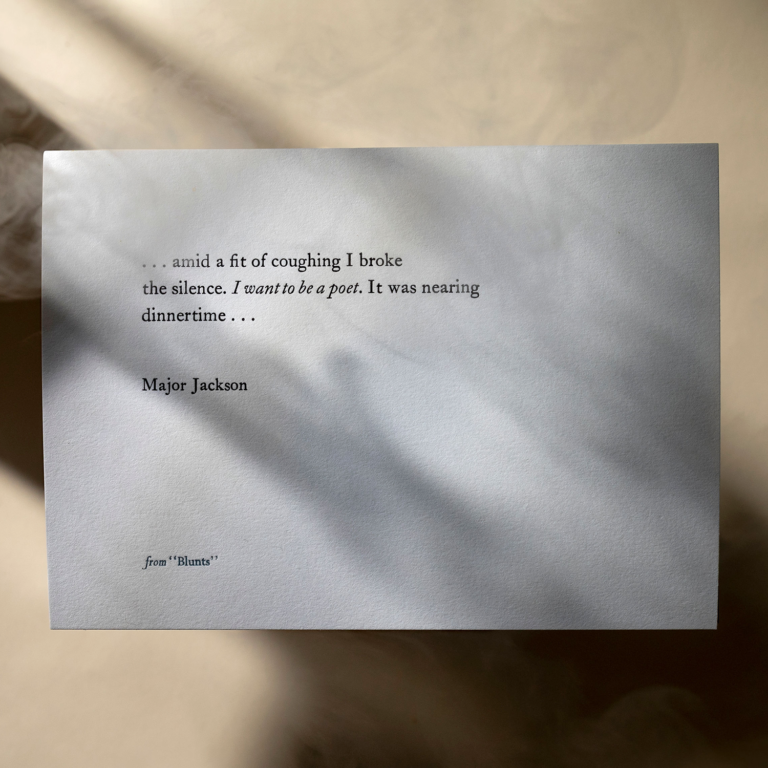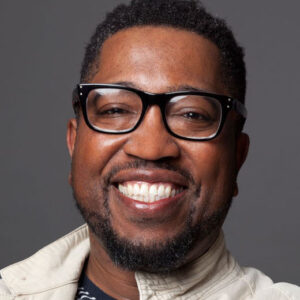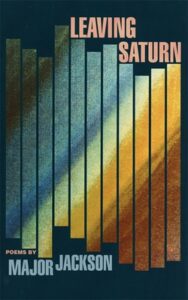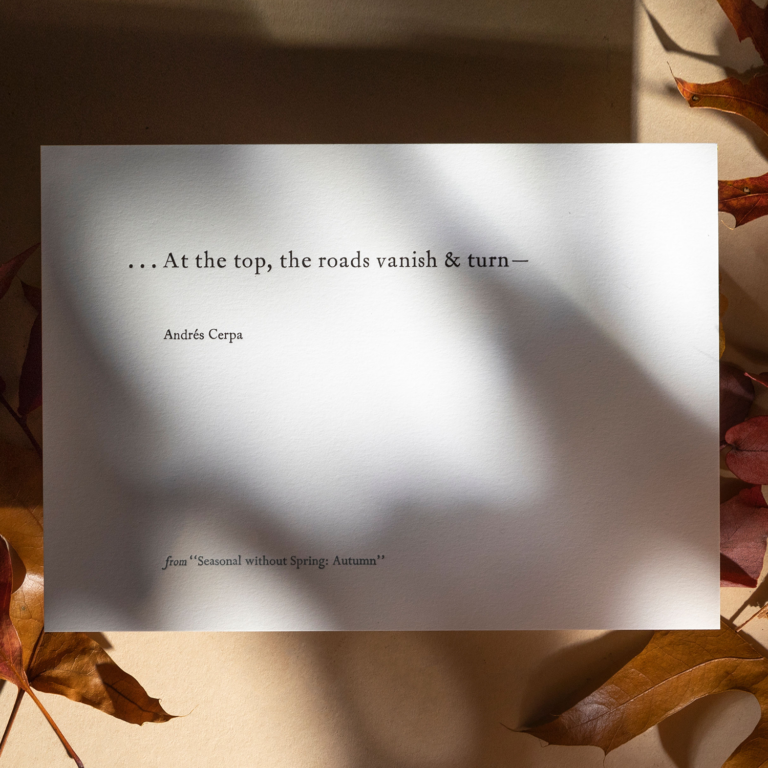Major Jackson
Blunts
Some friends gather and smoke at a doorway in a city. There’s Malik, and Johnny Cash, and Lefty, and Jësus. And the poet, Major Jackson. They’ve known each other their whole lives, and they wonder who they’ll turn out to be. In a moment of disclosure, Major tells his friends he wants to be a poet, astonishing them, and himself too it seems. In friendship and ribbing, in desire and teasing, this poem wonders who a person is, and what it means to hope.

Letterpress prints by Myrna Keliher | Photography by Lucero Torres
Guest

Major Jackson is the author of five books of poetry, including The Absurd Man (2020), Roll Deep (2015), Holding Company (2010), Hoops (2006) and Leaving Saturn (2002), which won the Cave Canem Poetry Prize for a first book of poems. Major Jackson lives in Nashville, Tennessee where he is the Gertrude Conaway Vanderbilt Chair in the Humanities at Vanderbilt University. He serves as the Poetry Editor of The Harvard Review.
Transcript
Pádraig Ó Tuama: My name is Pádraig Ó Tuama, and I’m not sure when I thought to myself, I want to be a poet. I know I was writing poetry from the age of 11. My sister found an early poem that I’d written, and she edited it and corrected it and said to me, “You’re not bad,” which was about as much of a compliment as I could’ve taken. I kept on writing poems and carrying them around with me, throughout all of my teens and 20s, and they were necessary for me, but I rarely showed them to anyone, because I read over them like some kind of mirror or confirmation about who I could be. It came later on that I thought that I might be able to share them.
[“Praise the Rain” by Gautam Srikishan]
“Blunts” by Major Jackson:
“The first time I got high I stood in a circle
of boys at 23rd & Ridge tucked inside
a doorway that smelled of urine. It was
March, the cold rains all but blurred
our sight as we feigned sophistication
passing a bullet-shaped bottle of malt.
Johnny Cash had a love for transcendental
numbers & explained between puffs resembling
little gasps of air the link to all creation was
the mathematician. Malik, the smartest
of the crew, couterargued & cited the holy life
of prayer as a gateway to the Islamic faith
that was for all intents the true path
for the righteous black man. No one disputed.
Malik cocked his head, pinched
the joint & pulled so hard we imagined
his lips crazy-glued into stiff O’s. It was long
agreed that Lefty would inherit his father’s
used-car business, thus destined for a life of wrecks.
Then amid a fit of coughing I broke
the silence. I want to be a poet. It was nearing
dinnertime. Jësus lived here. His sister was yelling
at their siblings over the evening news & game shows.
The stench of hot dogs & sauerkraut drifted
down the dank hallway. A prespring wind flapped
the plastic covering of a junkman’s shopping cart
as Eddie Hardrick licked left to right, the thin strip
of glue at the edge of a rolling paper, then uttered,
So, you want the tongue of God. I bent double
in the blade of smoke & looked up for help.
It was too late; we were tragically hip.”
[music: “The Consulate” by Blue Dot Sessions]
The first time I read this poem, I laughed out loud — just the image of these friends around, talking, somebody almost accidentally saying the truth — “I want to be a poet,” and the response to all of that. There’s such vivid memories of place in it, and such vivid memory, too, of the connections between these friends, and such vivid memories of time and vulnerability and the things that you say after you’ve been vulnerable, and the ways that a group of friends can cope and contain, with all that they imagine about the future, all that they know about the hardships of systemic racism, about the hardships of being from a part of the city where people will look down on them — and all, too, that you can imagine about yourself, wondering, can I really live into the imagination I have of myself? What would it be like to tell that? What’s it like to try out speaking about your future among some people who will probably laugh at you, as well as believe you?
[music: “Contrarian” by Blue Dot Sessions]
We know exactly where this poem is set: 23rd and Ridge, in North Philadelphia. And we know even more than that. It’s set in a doorway. And we know how the doorway smells — it smells of urine. And there’s a bunch of boys in a circle, tucked in that doorway. And these boys are: the guy speaking, Major Jackson, and someone called Johnny Cash, and then there’s Malik and Lefty and Jësus and Eddie Hardrick.
And they’re getting high; they’re passing a joint — a blunt, from the title — between them. And ultimately, they’re talking about pretty deep things. Johnny Cash loves transcendental numbers, and he is explaining all of creation through mathematics. And then Malik says, no no, the holy life of prayer leading to the Islamic faith is the pathway for the righteous Black man. And then they’re talking, too, about the future of Lefty. Lefty’s going to get his dad’s business, his used car business, and there’s the joke about, you know, his life is going to be destined to be “a life of wrecks.”
And that can mean so much, partly, perhaps, because they imagine that Lefty will always be in the same place where they all are, and is that going to be a wreck? There’s a question about what it’s like to stay in the neighborhood where you’re from. On the one hand, that gives a certain dependability and a familiarity to the future, but they’re joking, too, about the idea of that being a wreck.
And then they’re near where Jësus lives — we hear that his sister’s yelling over the sound of TV shows. Eddie Hardrick’s preparing another joint and has that extraordinary line in him, about the tongue of God. And Major Jackson wants to be a poet. So there’s these six friends — Johnny Cash, Malik, Lefty, Jësus, Eddie Hardrick, and Major Jackson, the poet — all of them standing in a circle, in a particular place. One’s explaining the mystery of the universe, the other one’s proposing how a Black man should live. They all expect the future of one of them. One of them has a sister. One wants to be a poet. And the other has razor-sharp lines.
[music: “Cornicob” by Blue Dot Sessions]
So you can look at these six friends standing around on a corner in this particular part of North Philly and just think, oh look, they’re just shooting the shit, talking about the mysteries of the universe, talking about each other’s families, talking about what they want. And you could ignore them, because you’re thinking, oh, they’re just getting high.
But they’re not ignorable, because they’re talking about real things. They’re friends, they know each other’s families, and they’re talking about what can be expected. They’re talking about how they understand where we’ve gotten to now. They know religion. They know racism. They know limitation. They know parts of the city.
There’s a very casual description about the guy who’s collecting stuff in a shopping cart. There is a recognition of poverty that’s right there among them, that possibly they’re part of. There’s no judgment of this man. They are all part of this particular part of an urban landscape, and they’re with each other trying to keep warm, recognizing the time of year, recognizing the time of life. I take them really seriously, in the midst of the affection and fun and pastime of this poem.
[music: “Tripoli” by Blue Dot Sessions]
You know, they’re talking about possibility together, and that is something that takes up a lot of time when you’re younger. What do you want to be? What do I expect myself to be? What will I be allowed to do, given the expectations that I have of myself and given the expectations that other people have of me?
And then Major Jackson says this extraordinary thing: “I want to be a poet.” That’s another theme in this poem — of vulnerability. There’s such a deft turn in the poem, because he says, “I want to be a poet,” and then suddenly we hear what time it was — near dinnertime; who lived there in the group — Jësus lives there, and we hear his sister shouting at the siblings over the news; there’s the smell that comes back in, but this time, it’s hot dogs and sauerkraut; and then there’s wind — “prespring wind,” flapping the plastic covering of the junkman’s shopping cart.
And then Eddie Hardrick, he licks left to right. Time is slowing down after Major Jackson has said this most extraordinarily vulnerable, hopeful, artistic, personal thing: “I want to be a poet.” And then Eddie Hardrick utters — he doesn’t “say,” he utters, like he himself is the mouthpiece of God. And he says, “So, you want the tongue of God.”
I think it’s a brilliant response. It’s a piece of poetry in itself. Eddie Hardrick is being a poet in replying back. And he believes that poetry is the “tongue of God.” What does that mean, the “tongue of God”? “Tongue” is also the word for language, in so many languages. And so somehow, perhaps, he’s saying that poetry has a capacity to speak about things from the point of view of God. “So, you want the tongue of God.” Is he kind of laughing at him? Is he just declaring a truth? Is he saying, “Who do you think you are?” or is he confirming this desire? All of them, probably, and it’s being said amongst a group of friends.
And then Major Jackson bends over double “in the blade of smoke,” and he looks up for help. What’s the help for? Is it help amidst the friends, for somebody to back him up? Is it help, just thinking, my God, I accidentally told the truth? I’ve been so loosened up by this blunt that I have actually told the very thing that’s on my heart?
That might be the help he’s looking for. Who knows? I don’t get the sense that it’s desperate help. It’s just help to figure out, how can I be this thing, with my friends, and how can I live into the possibility of desire that I’ve just named?
[music: “A Little Powder” by Blue Dot Sessions]
This poem is from a book called Leaving Saturn. And partly, that’s making a reference to this musician called Sun Ra, a jazz musician who had told everybody that his origin story was that he’d come from Saturn, which is absolutely bonkers and fantastical and brilliant. It’s kind of an imagination, though, that speaks about, who am I, where am I from, and what’s going to happen? And t hat’s a theme in this poem, which I really love.
There’s a very deft thing that happens in the first three lines of this poem. “The first time I got high I stood in a circle / of boys at 23rd & Ridge tucked inside / a doorway that smelled of urine.” And there’s three different ways within which the letter “I” can sound: “I/high/inside”; “in/ridge/inside/urine”; and then “first/circle/third.” So that can sound like a very clever way to make rhymes. But they’re all variations of this letter, “i,” and ultimately that’s one of the themes of this poem — the question of “I,” and who can I be, and who will allow that to be? Who will resist that being, and what do I need to do to make sure it happens?
[music: “Into the Earth” by Gautam Srikishan]
I think the invitation of this poem is to think about, what did you say you wanted to be, when you were younger? Who did you tell? What was it like, telling people? Was it a performance? Was it something quiet? Did you do that with great vulnerability? Were people surprised or delighted or shocked or resistant, when they said that? And what’s the conversation now, with that person that you were then? What’s the space between those things? How would you speak to each other?
[music: “Into the Earth” by Gautam Srikishan]
“Blunts” by Major Jackson:
“The first time I got high I stood in a circle
of boys at 23rd & Ridge tucked inside
a doorway that smelled of urine. It was
March, the cold rains all but blurred
our sight as we feigned sophistication
passing a bullet-shaped bottle of malt.
Johnny Cash had a love for transcendental
numbers & explained between puffs resembling
little gasps of air the link to all creation was
the mathematician. Malik, the smartest
of the crew, couterargued & cited the holy life
of prayer as a gateway to the Islamic faith
that was for all intents the true path
for the righteous black man. No one disputed.
Malik cocked his head, pinched
the joint & pulled so hard we imagined
his lips crazy-glued into stiff O’s. It was long
agreed that Lefty would inherit his father’s
used-car business, thus destined for a life of wrecks.
Then amid a fit of coughing I broke
the silence. I want to be a poet. It was nearing
dinnertime. Jësus lived here. His sister was yelling
at their siblings over the evening news & game shows.
The stench of hot dogs & sauerkraut drifted
down the dank hallway. A prespring wind flapped
the plastic covering of a junkman’s shopping cart
as Eddie Hardrick licked left to right, the thin strip
of glue at the edge of a rolling paper, then uttered,
So, you want the tongue of God. I bent double
in the blade of smoke & looked up for help.
It was too late; we were tragically hip.”
[“Praise the Rain” by Gautam Srikishan]
Chris Heagle: “Blunts” comes from Major Jackson’s book Leaving Saturn. Thank you to Major for giving us permission to use his poem. Read it on our website, at onbeing.org.
[“Praise the Rain” by Gautam Srikishan]
Poetry Unbound is: Gautam Srikishan, Erin Colasacco, Eddie Gonzalez, Lilian Vo, and me, Chris Heagle.
Our music is composed and provided by Gautam Srikishan and Blue Dot Sessions.
This podcast is produced by On Being Studios, which is located on Dakota land. We also produce other podcasts you might enjoy, like On Being with Krista Tippett, Becoming Wise, and This Movie Changed Me. Find those wherever you like to listen, or visit us at onbeing.org to find out more.
Books & Music
Recommended Reading
The On Being Project is an affiliate partner of Bookshop.org and Amazon.com. Any earnings we receive through these affiliate partnerships go into directly supporting The On Being Project.







